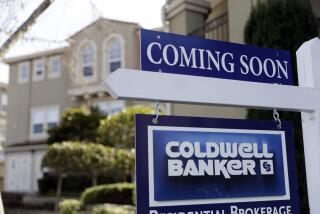Q&A: Homeowner association won’t make repairs; is there recourse?
- Share via
Question: We bought our property in a homeowner association more than 15 years ago, influenced by the salesperson, board and managers who promoted “community.” They emphasized amenities and goals of increasing and maintaining property values, ensuring marketability of homes. We now realize they’re more interested in planting flowers than fixing maintenance problems. They’d rather plan holiday events and potlucks than adequately repair our crumbling infrastructure. Many buildings have cracks in floors and walls. The covenants, conditions and restrictions (CC&Rs) require owners to insure their units or be fined. When our unit suffered damage caused by a common area, our insurer said it was the association’s fault, but the association’s insurance hasn’t committed to payment. The board hasn’t repaired it, and won’t let us repair it. Can we sue the manager, board and owners for damages and for diminishing the value of our unit?
Answer: Buying into a common interest development is tantamount to purchasing a business with several partners whom you have never met but to whom you give up all decision-making power, sharing only the liability.
While you may sue for damages, courts have rejected arguments to reimburse an individual homeowner for the diminution in value of his or her unit regardless of whether repairs had been made or how well the repairs were made. One court believes that imposing an additional economic burden on the board is misplaced and that the plaintiff’s problems are “somehow tied to the collective failure of the homeowners to vote for more responsible members to be governors of the association.” (Kaye v. Mount La Jolla Homeowners Assn.)
Often buyers are led to believe that the concept of homeowner associations is a rational systemization of shared responsibility, and that a homeowner association is implemented for the purpose of overall efficiency in the common-living environment, in particular for efficient maintenance. It is this notion of buying into an efficient organization that leads potential buyers right into the common-interest development conundrum.
Merely purchasing in the same development or living in close proximity to others does not automatically make one’s living environment a “community.” A deed-restricted development does not require a shared ideology; rather, its “commonality” typically requires only money and a property purchase.
Amenities alone should not be the reason for buying your property because owners may not have the ability to afford, let alone control, the amenity’s continued existence. Your pool could become a parking lot or a garden because the association can no longer afford to maintain and insure it. Buyers in an association give up direct control over such decisions the minute they purchase their properties.
“Diminished and/or increasing property values” are worthless catchphrases frequently unsupported by reliable evidence. Nothing in the Common Interest Development Act (Civil Code sections 4000 to 6130) defines such nebulous terms, nor does it make “increasing property values” part of a board’s duties.
Under the Kaye court, “the homeowner would not have suffered any damages for reduction in the unit’s value until that unit was sold.” And, no matter how much is received when sold, to get a complete picture of gain or loss, the seller needs to subtract all the costs, time spent on association-related business, monthly maintenance fees, special assessments, insurance, fines and penalties paid out during ownership.
For example, $300 per month for association dues is $3,600 per year and insurance of $1,000 per year must be subtracted from any increase in the property’s equity. This money must be spent every year just to keep possession of the property.
In the 15 years of living in your development, you have no doubt experienced some increase in property values. Just as the management company had nothing to do with property value increase before it was hired, it has nothing to do with any potential increase afterward.
If the damage to your unit is repairable, courts have rejected the theory that the owner may recover for any diminution in the value of the property.
In suing the manager, the Kaye court said, “individual members do not control the selection of managing agents except to the extent of their individual votes for members of the board of directors.”
Then in a scathing rebuke of a thoroughly exasperated homeowner whose damaged unit remained unrepaired after five years, the Kaye court argued that plaintiffs “overlook the bargain which they made at the time they acquired their unit. That bargain contemplated a harmonious group living arrangement subject to the rights and duties outlined in the CC&Rs [requiring the board] to repair common areas. There is nothing in the CC&Rs about a ‘forced buy,’ i.e., requiring individual homeowners to reimburse an individual homeowner for the diminution in value of a unit in addition to the cost of repair — [that] is not only contrary to the bargain but creates a potentially open-ended financial burden on condominium ownership.”
Buyers need to beef up their due diligence investigations prior to making an offer to purchase and owners need to understand that every vote counts in board elections.
Zachary Levine, partner at Wolk & Levine, a business and intellectual property law firm, co-wrote this column. Vanitzian is an arbitrator and mediator. Send questions to Donie Vanitzian JD, P.O. Box 10490, Marina del Rey, CA 90295 or noexit@mindspring.com.
More to Read
Sign up for Essential California
The most important California stories and recommendations in your inbox every morning.
You may occasionally receive promotional content from the Los Angeles Times.






